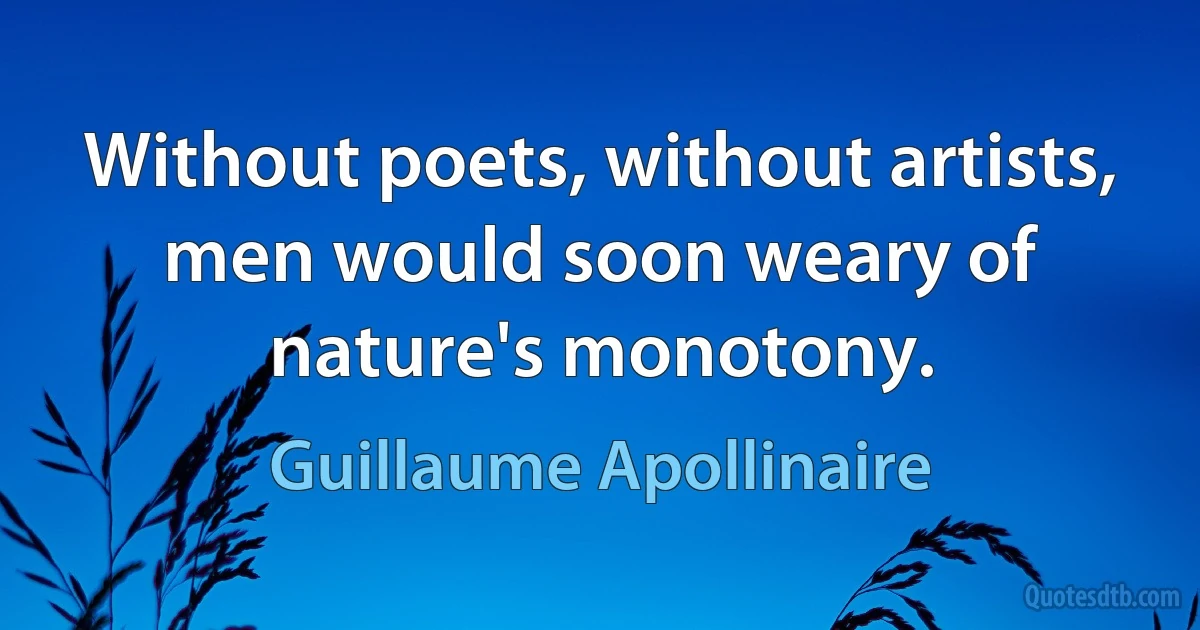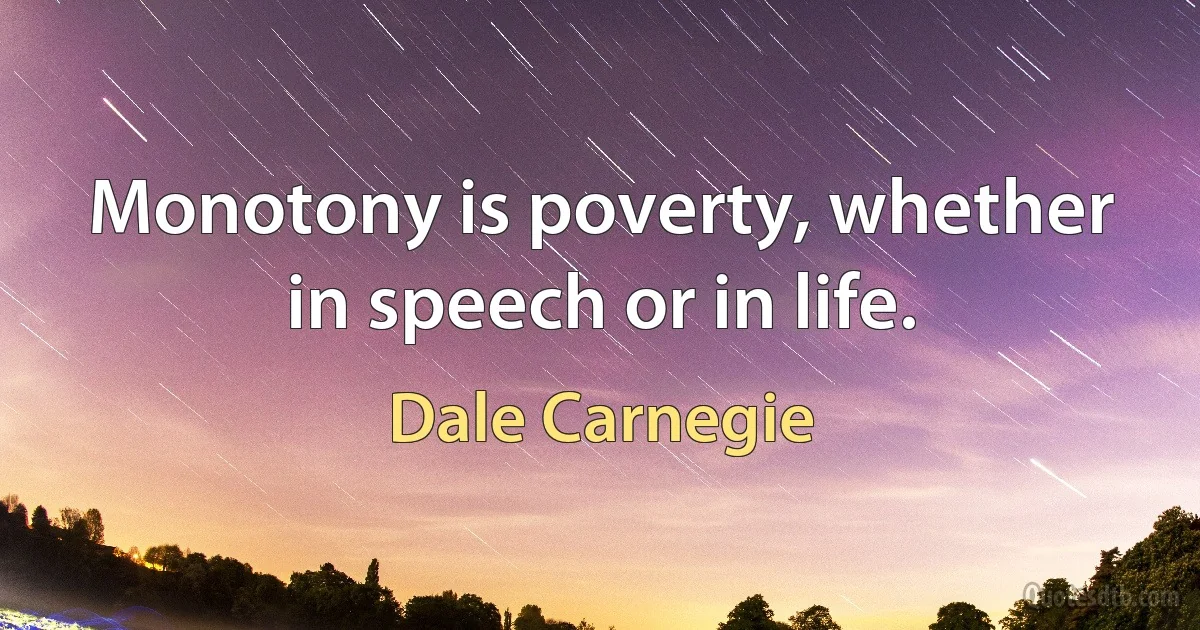Monotony Quotes - page 2
First were the thick stone walls, the arches, then the domes and vaults - of the architect, searching out for wider spaces.
Now it is concrete-reinforced that gives our imagination flight with its soaring spans and uncommon cantilevers. Concrete, to which architecture is integrated, through which it is able to discard the foregone conclusions of rationalism, with its monotony and repetitious solutions.
A concern for beauty, a zest for fantasy, and an ever-present element of surprise bear witness that today's architecture is not a minor craft bound to straight-edge rules, but an architecture imbued with technology: light, creative and unfettered, seeking out its architectural scene.

Oscar Niemeyer
The rectangular plane of varying dimensions and colours visibly demonstrates that internationalism does not mean chaos ruled by monotony but an ordered and clearly divided unity. In Neo-Plasticism, there are, in fact, very definite boundaries. But these boundaries are not really closed; the straight lines in rectangular opposition to one another constantly intersect, so that their rhythm continues throughout the whole work... These frontiers will be clearly defined but not 'closed'; there will be no customs, no work permits. 'Foreigners' will not be viewed as aliens.

Piet Mondrian
I exhibited three paintings at the Salon d'Automne exhibition [Paris], which is the most interesting exhibition I have seen until now. Much more interesting than the Secession [in München]. My paintings [two words cancelled] were noticed and praised by the art critics. I think I will be very famous here in a few years time. Reading my name in the newspapers and seeing people notice my paintings and write about them has given me new and strange joy. – Paris is a beautiful city. Why do you remain in the monotony of Munich's heavy atmosphere? Here one can find everything one desires. Everything is refined and has spirit and everyday one learns something new.. The French are more intelligent than I thought. They laugh a lot, but they understand better than the Germans what is refined, strange and outside the ordinary.

Giorgio de Chirico
I beheld such a sight as I had never beheld before, and which no living person can have seen save in the delirium of fever or the inferno of opium. The building stood on a narrow point of land - or what was now a narrow point of land - fully three hundred feet above what must lately have been a seething vortex of mad waters. On either side of the house there fell a newly washed-out precipice of red earth, whilst ahead of me the hideous waves were still rolling in frightfully, eating away the land with ghastly monotony and deliberation.

H. P. Lovecraft
The politics of rock 'n' roll, in England or America or anywhere else, is that a whole lot of kids want to be fried out of their skins by the most scalding propulsion they can find, for a night they can pretend is the rest of their lives, and whether the next day they go back to work in shops or boredom on the dole or American TV doldrums in Mom 'n' Daddy's living room nothing can cancel the reality of that night in the revivifying flames when for once if only then in your life you were blasted out of yourself and the monotony which defines most life anywhere at any time, when you supped on lightning and nothing else in the realms of the living or dead mattered at all.

Lester Bangs
You live like this, sheltered, in a delicate world, and you believe you are living. Then you read a book(Lady Chatterley, for instance), or you take a trip, or you talk with Richard, and you discover that you are not living, that you are hibernating. The symptoms of hibernating are easily detectable first, restlessness. The second symptom(when hibernating becomes dangerous and might degenerate into death) absence of pleasure. That is all. It appears like an innocuous illness. Monotony, boredom, death. Millions live like this(or die like this) without knowing it. They work in offices. They drive a car. They picnic with their families. They raise children. And then some shock treatment takes place, a person, a book, a song, and it awakens them and saves them from death.

Anaïs Nin
A man and a woman who, in their young days, agree to have done with sentimental life thereby renounce the search for adventure, the intoxication of new encounters, and the amazing refreshment produced by falling in love again. Their most vital source of energy is cut off; they are doomed to premature insensibility. Their life, scarcely begun, is finished. Nothing can break the monotony of an existence made up of burdens and duties. No further hope, no surprises, no conquests. Their one love will soon be tainted by the cares of housekeeping and the children's education. They will reach old age without ever having known the joys of youth. Marriage destroys romantic love which alone could justify it.

André Maurois
This revolution of music is paralleled by the increasing proliferation of machinery sharing in human labor. In the pounding atmosphere of great cities as well as in the formerly silent countryside, machines create today such a large number of varied noises that pure sound, with its littleness and its monotony, now fails to arouse any emotion.

Luigi Russolo
There is one thing that makes life mighty in its veriest trifles, worthy in its smallest deeds, that delivers it from monotony, that delivers it from insignificance. All will be great, nothing will be overpowering, when, living in communion with Jesus Christ, we say as He says, "My meat is to do the will of Him that sent me.

Alexander Maclaren
Habit... makes the endurance of evil easy (which, under the name of patience, is falsely honored as a virtue), because sensations of the same type, when continued without alteration for a long time, draw our attention away from the senses so that we are scarcely conscious of them at all. On the other hand, habit also makes the consciousness and the remembrance of good that has been received more difficult, which then gradually leads to ingratitude (a real vice). [...] Acquired habit deprives good actions of their moral value because it undermines mental freedom and, moreover, it leads to thoughtless repetitions of the same acts (monotony), and thus becomes ridiculous.

Immanuel Kant
Yet now despair itself is mild,
Even as the winds and waters are;
I could lie down like a tired child,
And weep away the life of care
Which I have borne and yet must bear,
Till death like sleep might steal on me,
And I might feel in the warm air
My cheek grow cold, and hear the sea
Breathe o'er my dying brain its last monotony.

Percy Bysshe Shelley
Love is like some fresh spring, that leaves its cresses, its gravel bed and flowers to become first a stream and then a river, changing its aspect and its nature as it flows to plunge itself in some boundless ocean, where restricted natures only find monotony, but where great souls are engulfed in endless contemplation.

Honoré de Balzac



